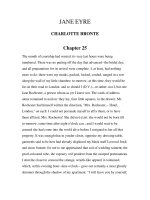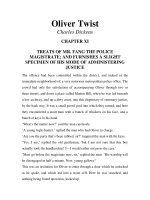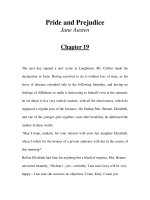LUYỆN ĐỌC TIẾNG ANH QUA TÁC PHẨM VĂN HỌC-JANE EYRE CHARLOTTE BRONTE Chapter 33
Bạn đang xem bản rút gọn của tài liệu. Xem và tải ngay bản đầy đủ của tài liệu tại đây (47.1 KB, 20 trang )
JANE EYRE
CHARLOTTE BRONTE
Chapter 33
When Mr. St. John went, it was beginning to snow; the whirling storm
continued all night. The next day a keen wind brought fresh and blinding
falls; by twilight the valley was drifted up and almost impassable. I had
closed my shutter, laid a mat to the door to prevent the snow from blowing
in under it, trimmed my fire, and after sitting nearly an hour on the hearth
listening to the muffled fury of the tempest, I lit a candle, took down
"Marmion," and beginning -
"Day set on Norham's castled steep, And Tweed's fair river broad and deep,
And Cheviot's mountains lone; The massive towers, the donjon keep, The
flanking walls that round them sweep, In yellow lustre shone" -
I soon forgot storm in music.
I heard a noise: the wind, I thought, shook the door. No; it was St. John
Rivers, who, lifting the latch, came in out of the frozen hurricane--the
howling darkness--and stood before me: the cloak that covered his tall figure
all white as a glacier. I was almost in consternation, so little had I expected
any guest from the blocked-up vale that night.
"Any ill news?" I demanded. "Has anything happened?"
"No. How very easily alarmed you are?" he answered, removing his cloak
and hanging it up against the door, towards which he again coolly pushed
the mat which his entrance had deranged. He stamped the snow from his
boots.
"I shall sully the purity of your floor," said he, "but you must excuse me for
once." Then he approached the fire. "I have had hard work to get here, I
assure you," he observed, as he warmed his hands over the flame. "One drift
took me up to the waist; happily the snow is quite soft yet."
"But why are you come?" I could not forbear saying.
"Rather an inhospitable question to put to a visitor; but since you ask it, I
answer simply to have a little talk with you; I got tired of my mute books
and empty rooms. Besides, since yesterday I have experienced the
excitement of a person to whom a tale has been half- told, and who is
impatient to hear the sequel."
He sat down. I recalled his singular conduct of yesterday, and really I began
to fear his wits were touched. If he were insane, however, his was a very
cool and collected insanity: I had never seen that handsome-featured face of
his look more like chiselled marble than it did just now, as he put aside his
snow-wet hair from his forehead and let the firelight shine free on his pale
brow and cheek as pale, where it grieved me to discover the hollow trace of
care or sorrow now so plainly graved. I waited, expecting he would say
something I could at least comprehend; but his hand was now at his chin, his
finger on his lip: he was thinking. It struck me that his hand looked wasted
like his face. A perhaps uncalled-for gush of pity came over my heart: I was
moved to say -
"I wish Diana or Mary would come and live with you: it is too bad that you
should be quite alone; and you are recklessly rash about your own health."
"Not at all," said he: "I care for myself when necessary. I am well now.
What do you see amiss in me?"
This was said with a careless, abstracted indifference, which showed that my
solicitude was, at least in his opinion, wholly superfluous. I was silenced.
He still slowly moved his finger over his upper lip, and still his eye dwelt
dreamily on the glowing grate; thinking it urgent to say something, I asked
him presently if he felt any cold draught from the door, which was behind
him.
"No, no!" he responded shortly and somewhat testily.
"Well," I reflected, "if you won't talk, you may be still; I'll let you alone
now, and return to my book."
So I snuffed the candle and resumed the perusal of "Marmion." He soon
stirred; my eye was instantly drawn to his movements; he only took out a
morocco pocket-book, thence produced a letter, which he read in silence,
folded it, put it back, relapsed into meditation. It was vain to try to read with
such an inscrutable fixture before me; nor could I, in impatience, consent to
be dumb; he might rebuff me if my he liked, but talk I would.
"Have you heard from Diana and Mary lately?"
"Not since the letter I showed you a week ago."
"There has not been any change made about your own arrangements? You
will not be summoned to leave England sooner than you expected?"
"I fear not, indeed: such chance is too good to befall me." Baffled so far, I
changed my ground. I bethought myself to talk about the school and my
scholars.
"Mary Garrett's mother is better, and Mary came back to the school this
morning, and I shall have four new girls next week from the Foundry Close-
-they would have come to-day but for the snow."
"Indeed!"
"Mr. Oliver pays for two."
"Does he?"
"He means to give the whole school a treat at Christmas."
"I know."
"Was it your suggestion?"
"No."
"Whose, then?"
"His daughter's, I think."
"It is like her: she is so good-natured."
"Yes."
Again came the blank of a pause: the clock struck eight strokes. It aroused
him; he uncrossed his legs, sat erect, turned to me.
"Leave your book a moment, and come a little nearer the fire," he said.
Wondering, and of my wonder finding no end, I complied.
"Half-an-hour ago," he pursued, "I spoke of my impatience to hear the
sequel of a tale: on reflection, I find the matter will be better managed by my
assuming the narrator's part, and converting you into a listener. Before
commencing, it is but fair to warn you that the story will sound somewhat
hackneyed in your ears; but stale details often regain a degree of freshness
when they pass through new lips. For the rest, whether trite or novel, it is
short.
"Twenty years ago, a poor curate--never mind his name at this moment--fell
in love with a rich man's daughter; she fell in love with him, and married
him, against the advice of all her friends, who consequently disowned her
immediately after the wedding. Before two years passed, the rash pair were
both dead, and laid quietly side by side under one slab. (I have seen their
grave; it formed part of the pavement of a huge churchyard surrounding the
grim, soot-black old cathedral of an overgrown manufacturing town in -
shire.) They left a daughter, which, at its very birth, Charity received in her
lap--cold as that of the snow-drift I almost stuck fast in to-night. Charity
carried the friendless thing to the house of its rich maternal relations; it was
reared by an aunt-in-law, called (I come to names now) Mrs. Reed of
Gateshead. You start--did you hear a noise? I daresay it is only a rat
scrambling along the rafters of the adjoining schoolroom: it was a barn
before I had it repaired and altered, and barns are generally haunted by rats.-
-To proceed. Mrs. Reed kept the orphan ten years: whether it was happy or
not with her, I cannot say, never having been told; but at the end of that time
she transferred it to a place you know--being no other than Lowood School,
where you so long resided yourself. It seems her career there was very
honourable: from a pupil, she became a teacher, like yourself--really it
strikes me there are parallel points in her history and yours--she left it to be a
governess: there, again, your fates were analogous; she undertook the
education of the ward of a certain Mr. Rochester."
"Mr. Rivers!" I interrupted.
"I can guess your feelings," he said, "but restrain them for a while: I have
nearly finished; hear me to the end. Of Mr. Rochester's character I know
nothing, but the one fact that he professed to offer honourable marriage to
this young girl, and that at the very altar she discovered he had a wife yet
alive, though a lunatic. What his subsequent conduct and proposals were is a
matter of pure conjecture; but when an event transpired which rendered
inquiry after the governess necessary, it was discovered she was gone--no
one could tell when, where, or how. She had left Thornfield Hall in the
night; every research after her course had been vain: the country had been
scoured far and wide; no vestige of information could be gathered respecting
her. Yet that she should be found is become a matter of serious urgency:
advertisements have been put in all the papers; I myself have received a
letter from one Mr. Briggs, a solicitor, communicating the details I have just
imparted. Is it not an odd tale?"
"Just tell me this," said I, "and since you know so much, you surely can tell
it me--what of Mr. Rochester? How and where is he? What is he doing? Is
he well?"
"I am ignorant of all concerning Mr. Rochester: the letter never mentions
him but to narrate the fraudulent and illegal attempt I have adverted to. You
should rather ask the name of the governess-- the nature of the event which
requires her appearance."
"Did no one go to Thornfield Hall, then? Did no one see Mr. Rochester?"
"I suppose not."
"But they wrote to him?"
"Of course."
"And what did he say? Who has his letters?"
"Mr. Briggs intimates that the answer to his application was not from Mr.
Rochester, but from a lady: it is signed 'Alice Fairfax.'"
I felt cold and dismayed: my worst fears then were probably true: he had in
all probability left England and rushed in reckless desperation to some
former haunt on the Continent. And what opiate for his severe sufferings--
what object for his strong passions--had he sought there? I dared not answer
the question. Oh, my poor master--once almost my husband--whom I had
often called "my dear Edward!"
"He must have been a bad man," observed Mr. Rivers.
"You don't know him--don't pronounce an opinion upon him," I said, with
warmth.
"Very well," he answered quietly: "and indeed my head is otherwise
occupied than with him: I have my tale to finish. Since you won't ask the
governess's name, I must tell it of my own accord. Stay! I have it here--it is
always more satisfactory to see important points written down, fairly
committed to black and white."
And the pocket-book was again deliberately produced, opened, sought
through; from one of its compartments was extracted a shabby slip of paper,
hastily torn off: I recognised in its texture and its stains of ultra-marine, and
lake, and vermillion, the ravished margin of the portrait-cover. He got up,
held it close to my eyes: and I read, traced in Indian ink, in my own
handwriting, the words "JANE EYRE"--the work doubtless of some moment
of abstraction.
"Briggs wrote to me of a Jane Eyre:" he said, "the advertisements demanded
a Jane Eyre: I knew a Jane Elliott.--I confess I had my suspicions, but it was
only yesterday afternoon they were at once resolved into certainty. You own
the name and renounce the alias?"
"Yes--yes; but where is Mr. Briggs? He perhaps knows more of Mr.
Rochester than you do."
"Briggs is in London. I should doubt his knowing anything at all about Mr.
Rochester; it is not in Mr. Rochester he is interested. Meantime, you forget
essential points in pursuing trifles: you do not inquire why Mr. Briggs
sought after you--what he wanted with you."









